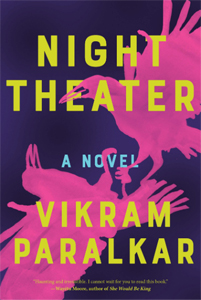Vikram Paralkar’s “Night Theater” (2020) is a one-setting, small-cast novella of a little over 200 pages that raises big questions. It’s easy to read in prose but tough to read in content. Set in a dirt-poor village in what seems to be India, it follows a curmudgeonly surgeon who receives three bizarre visitors as he’s about to close shop for the night.
An unplanned night shift
In this “Twilight Zone”-esque fable, Paralkar identifies the clinic’s workers/helpers as the surgeon, the pharmacist (a younger woman) and the pharmacist’s husband. The three visitors are the teacher, the teacher’s wife (who is pregnant) and the teacher’s son. They have injuries from a stabbing attack that have “killed” them, except they are still walking and talking – for mysterious reasons to be parsed out.
“Night Theater” fits into a genre usually associated with films: body horror. Obviously a surgeon IRL or someone who has thoroughly researched the topic, the author doesn’t shy away from descriptions as the novel’s surgeon probes into the three living corpses and stitches them up.

“Night Theater” (2020)
Author: Vikram Paralkar
Genres: Horror, spirituality, mystery
Setting: Present day rural southeast Asia
Note to readers: The Book Club Book Report series features books I’m reading for my book club, Brilliant Bookworms.
Those segments were tough for me to read. Although I’m not the extreme level of squeamish (I can watch horror or action movies if the violence is cartoonish), I prefer to give medical issues only the minimum level of thought before moving on.
Paralkar does provide a release valve with the other major theme: What comes after death? He’s cheeky about it, suggesting angels work amid a bureaucracy of power-based, under-the-table checks and balances. In a parallel, the surgeon has to deal with the same thing: He’s employed by a corrupt government, and uses his own money to keep his clinic functioning.
Observations of life’s cruelties
Consistently morbid and depressive, but never with hope snuffed out, “Night Theater” makes well-taken points about the difference between how someone appears and how they truly are on the inside. The surgeon would be defined as a nasty man by anyone who spends time with him, yet all of his decisions are driven by how he can help others.
I’m not all that much into religion, but sometimes I like wild dives into religious theory (for instance, Philip K. Dick is my favorite author). “Night Theater” is a delicate dip into these waters – playful but not wildly original. Paralkar has one character tell another a fable about how to enter into god’s kingdom, in addition to tip-toeing into the angelic bureaucratic structure.
In the end, the author is aiming for a novella so grounded in misery that the beautiful spiritual moment we’re building up to has some plausibility. Indeed, Paralkar successfully portrays a scenario in which humans would witness a miracle yet never tell another person about it.

“Night Theater” is not a long journey in page count or readability. But everyone’s daily lives are awful, and we get a lot of detail about innards that only a surgeon needs to know. The points about the difference between disgusting everyday life (both psychologically and anatomically) and the beauty of spiritual magic are well taken.
“Night Theater” is a litmus test for a reader’s taste. It’s not my cup of tea, and I can equally imagine another person loving it or loathing it. I admire how Paralkar writes something so accessible in its prose and pacing without ever hooking me with the topic.

